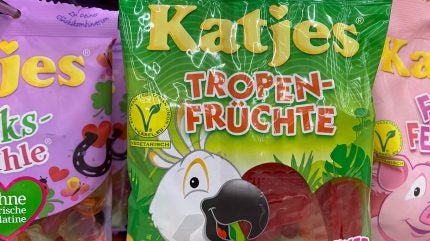
A ruling from Germany’s Federal Court of Justice that confectioner Katjes cannot call its fruit gums ‘climate neutral’ will impact food advertising and labelling, industry experts have told Just Food.
The Bundesgerichtshof (BGH), referring to a 2021 fruit gum advert in food industry trade magazine Lebensmittelzeitung, said companies cannot advertise their products as climate-friendly without explaining why. Simply showing a web address and QR code link to Katjes’ partner company ClimatePartner that details the candy maker’s support for climate protection projects, was not enough, the court ruled.

Discover B2B Marketing That Performs
Combine business intelligence and editorial excellence to reach engaged professionals across 36 leading media platforms.
“Companies may find themselves compelled to more rigorously check and substantiate their environment and climate-related claims to avoid legal challenges,” Stefanie Sabet, the managing director of BVE, Germany’s food and drink industries federation, said.
“This could lead to increased costs and operational adjustments, as the required proof standards might become stricter and more complex.”
Moreover, similar terms such as ‘CO2 neutral’, ‘eco-friendly’ or ‘resource-saving’, could also be affected, Sabet said. Companies could only use them “if they can provide clear evidence and a transparent methodology that supports the claimed status”.
Nevertheless, Sabet said without clear EU-wide regulations on green claims (which is still under discussion by the European Parliament and the EU Council of Ministers) “there remains some uncertainty about the specific methods and systems of proof that need to be met”.

US Tariffs are shifting - will you react or anticipate?
Don’t let policy changes catch you off guard. Stay proactive with real-time data and expert analysis.
By GlobalDataLeonie Evans, partner at Munich law firm Meisterernst, described the decision as “strict”.
“It qualifies the term ‘climate neutral’ as ambiguous and requests the term’s specific meaning to be explained in the advertising itself,” Evans said.
However, she added judges could have been tougher and more detailed in their ruling, given the existence of past green-claims cases focusing on the narrower scope of claims linked to offset schemes. Those cases ruled “climate-neutral claims cannot be made at all if they rely on compensation measures instead of reduction”, Evans explained.
Nevertheless, Evans argued the ruling would “bring some clarity to using green claims, also impacting similar environmental claims such as ‘carbon positive’ or ‘climate friendly’” within Germany.
She told Just Food a reference point could be recital 12 of a new EU law, the ‘empowering consumers for the green transition’ (EmpCo) directive 2024/825, which states the examples ‘CO2 neutral certified’, ‘carbon positive’, ‘climate net zero’, ‘climate compensated’, ‘reduced climate impact’ and ‘limited CO2 footprint.
The law says: “Such claims should only be allowed when they are based on the actual lifecycle impact of the product in question, and not based on the offsetting of greenhouse gas emissions outside the product’s value chain, as the former and the latter are not equivalent.”
This directive bans “claiming, based on the offsetting of greenhouse gas emissions, that a product has a neutral, reduced or positive impact on the environment…without a case-by-case evaluation”, Evans added.





